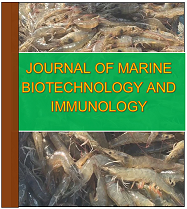Tentang Jurnal Ini

Aims and scope
Marine Biotechnology and Immunology is a combined field that involves the intersection of marine biotechnology and immunology. It encompasses research and applications related to the use of biotechnological tools and techniques to study and manipulate the immune systems of marine organisms. Here are some key aspects and areas of focus within this interdisciplinary field:
- Immunomodulation in Marine Organisms: Researchers in this field study how the immune systems of marine species respond to various biotechnological interventions. This includes understanding how factors such as vaccination, genetic manipulation, and immune-enhancing compounds can modulate immune responses in marine organisms.
- Vaccine Development for Aquatic Species: Marine biotechnology and immunology are applied to the development of vaccines for aquatic organisms, particularly those used in aquaculture. These vaccines aim to protect marine species from diseases and infections that can impact aquaculture operations.
- Genetic Approaches to Enhance Immunity: Genetic engineering techniques are used to enhance the immune systems of marine species. This may involve the insertion of specific genes to improve disease resistance or immune response.
- Biotechnological Tools for Immunological Research: Advanced biotechnological tools, such as genomics, proteomics, and transcriptomics, are used to study the immune responses of marine organisms at the molecular level. This helps in understanding the genes and proteins involved in immunity.
- Bioactive Compounds from Marine Organisms: Marine biotechnology is employed to isolate and study bioactive compounds from marine organisms, such as sponges, algae, and microorganisms. Some of these compounds may have immunomodulatory properties and can be used in pharmaceuticals or biotechnology applications.
- Environmental Immunology: Research in this field also explores how environmental factors, pollutants, and climate change can impact the immune systems of marine organisms. This includes studying how environmental stressors affect immunological responses.
- Aquatic Disease Management: Marine biotechnology and immunology play a critical role in managing diseases in aquatic ecosystems. Understanding the immune responses of marine species is crucial for disease prevention and control.
- Marine Conservation: The field contributes to the conservation of marine species by developing strategies to protect them from diseases and environmental threats. Healthy immune systems are essential for the survival of vulnerable marine populations.
- Biotechnology in Marine Immunotherapy: Biotechnological approaches may be used to develop immunotherapies for marine animals, similar to how immunotherapies are used in human medicine.
- Marine biotechnology : refers to the application of biotechnological techniques and principles to marine organisms, ecosystems, and their derivatives for various scientific, industrial, and commercial purposes. It involves the study, manipulation, and utilization of marine organisms like microorganisms, algae, and other marine life forms, as well as the exploration of marine ecosystems to develop products and processes for various sectors, including pharmaceuticals, aquaculture, environmental management, and food production. Marine biotechnology has the potential to provide sustainable solutions to various challenges and opportunities related to marine resources and biodiversity.
- Marine ecology : the scientific study of marine ecosystems and the interactions among organisms and their environment in the world's oceans and seas. It is a branch of ecology, which is the study of how living organisms interact with one another and their physical and biological surroundings. Marine ecology focuses specifically on the unique conditions and biodiversity found in marine environments.
- Marine pathogen : a microorganism, typically a bacterium, virus, or fungus, that can cause diseases or infections in marine organisms. These pathogens are responsible for various diseases in marine animals and plants, and they can have significant ecological and economic impacts on marine ecosystems, aquaculture industries, and seafood production. Efforts to mitigate the impacts of marine pathogens often involve a combination of monitoring, biosecurity measures, improved husbandry practices in aquaculture, and research into disease-resistant strains of marine organisms. The study of marine pathogens is essential for the conservation of marine biodiversity and the sustainability of marine industries.







